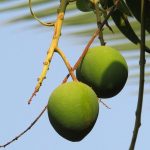The African mango (Irvingia gabonensis) has been making waves in the weight loss industry, with claims that it can help shed pounds quickly and effectively. But what does the science say about this tropical fruit? Is African mango truly a weight loss miracle, or is it just another marketing ploy?
**What is African Mango?**
African mango is a large, green fruit native to West Africa. It has been used for centuries by traditional healers to treat various ailments, including fever, constipation, and weight problems. The fruit contains a number of compounds that have been shown to have potential health benefits, including fiber, antioxidants, and a substance called Irvingia gabonensis extract (IGOB131).
**How Does African Mango Work?**
IGOB131 is believed to work by inhibiting the activity of an enzyme called lipoprotein lipase (LPL). LPL is responsible for breaking down fats in the bloodstream and delivering them to fat cells. By inhibiting LPL, IGOB131 may help to reduce the amount of fat that is stored in the body.
African mango also contains a number of other compounds that may contribute to its weight loss effects. These compounds include:
* **Fiber:** Fiber helps to promote satiety and fullness, which can lead to reduced calorie intake.
* **Antioxidants:** Antioxidants help to protect cells from damage, which may help to improve overall health and well-being.
* **Leptin:** Leptin is a hormone that helps to regulate appetite and energy expenditure. African mango may help to increase leptin levels, which can lead to reduced hunger and increased calorie burning.
**Scientific Evidence**
There is some scientific evidence to support the weight loss claims made about African mango. A number of studies have shown that IGOB131 can help to reduce body weight and body fat. For example, one study published in the journal "Obesity" found that overweight and obese adults who took IGOB131 for 12 weeks lost an average of 13 pounds and 3 inches from their waist circumference.
Another study, published in the journal "Lipids in Health and Disease," found that IGOB131 helped to reduce cholesterol levels and improve blood sugar control in obese adults. These findings suggest that African mango may have a number of health benefits beyond weight loss.
**Side Effects and Safety**
African mango is generally considered to be safe for most people. However, some side effects have been reported, including:
* Gastrointestinal upset (e.g., nausea, vomiting, diarrhea)
* Headache
* Dizziness
* Insomnia
Pregnant women and people with certain medical conditions should talk to their doctor before taking African mango.
**Dosage**
The recommended dosage of African mango varies depending on the product you are using. Most supplements contain between 150 and 300 mg of IGOB131 per capsule. It is important to start with a low dose and gradually increase it as needed.
**Conclusion**
African mango is a promising weight loss supplement that has been shown to have some scientific evidence to support its claims. However, more research is needed to confirm the long-term safety and effectiveness of this supplement. If you are considering taking African mango for weight loss, be sure to talk to your doctor first to discuss the potential risks and benefits.

